Cloud Telephony for Healthcare: Benefits & Use Cases
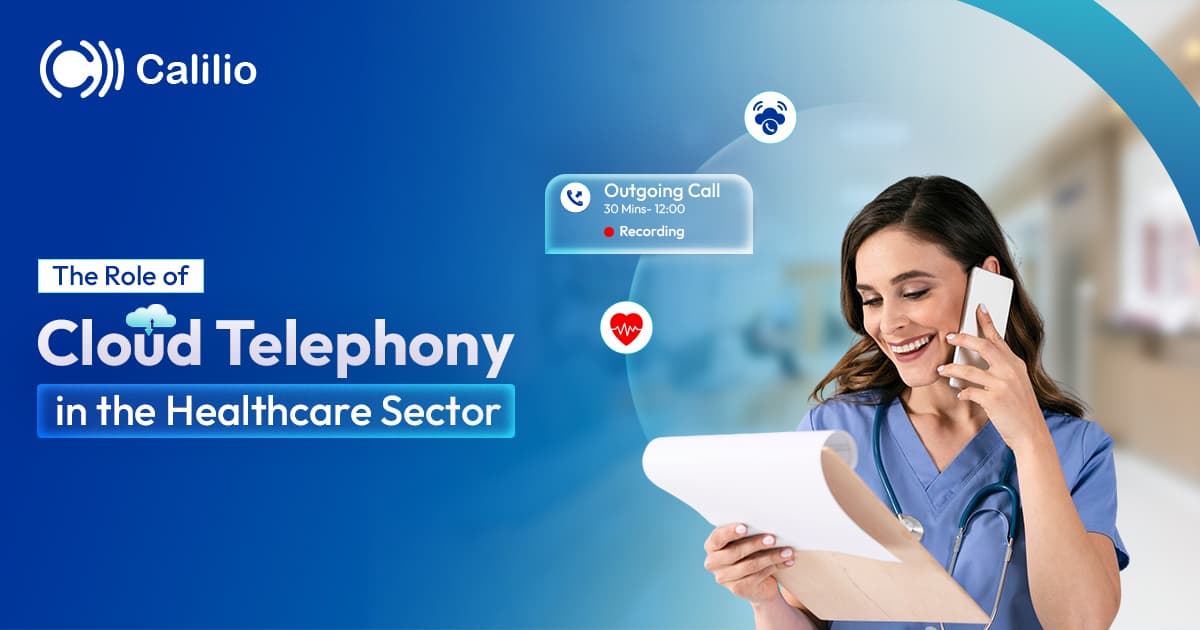
Healthcare providers often struggle with missed calls, long hold times, and misrouted calls, directly impacting the patients and their health. In a healthcare sector where fast and clear interaction is non-negotiable, using an outdated phone system with no advanced features can be frustrating and dangerous to patients’ lives.
Therefore, modern medical organizations are swiftly moving on to the cloud telephony platform to address the poor workflows and inefficiencies of the traditional system. Cloud-based or Voice over Internet Protocol (VoIP) phone systems improve response time with smart call routing and remote access, ultimately enhancing patient satisfaction and care.
Whether you're running a hospital, clinic, or insurance business, having a reliable cloud telephony system can make a significant difference as it allows you to communicate securely and efficiently within internal teams and with patients.
In this guide, we’ll explore the key benefits, use cases, and top platforms revolutionizing healthcare communication, and how cloud telephony is shaping the future of the industry.
Highlights:
A healthcare cloud telephone system offers remote access, making it a professional and cost-effective telephony solution for healthcare centers. With easy scalability and HIPAA compliance, it helps deliver a secure patient experience.
Cloud healthcare telephony is used for appointment scheduling, automated reminders, and virtual consultations. Agents can follow up with the patients, while patients can request and receive the prescription refill through the cloud telephony platform.
Calilio, Nextiva, Five9, Dialpad, and RingCentral are among the 5 best cloud telephony platforms for healthcare.
The future of cloud telephony in healthcare lies in telemedicine, telehealth, and the fullest use of AI. Use of AI in the call center will enhance real-time support through smart call handling.
Benefits of Cloud Telephony in Healthcare
Cloud telephony gives you remote access with smart call forwarding, so your patients can reach help anytime, even after hours. Moreover, it helps you reduce operational costs since there’s no need for bulky phone systems. With that, features like auto-attendants and virtual receptionists make it easier for your team to handle calls, reduce wait times, and deliver faster care.
Remote Access
Cloud phone system ensures that if the hospital’s main number goes unanswered, whether during lunch breaks, sick leaves, or after hours, calls are automatically forwarded to backup staff or on-call personnel. With call forwarding, patients’ calls can be redirected to another number or mobile device, so they can still reach help when the front desk is temporarily unavailable.
Cost Effectiveness
Since cloud telephony is VoIP-based, healthcare centers can avoid costly hardware and maintenance, reducing the high cost of infrastructure. As the calls are routed through the internet, long-distance and international calls become much more affordable, leading to significant savings for hospitals and clinics.
Also, VoIP phone systems have an auto-attendant or virtual receptionist, which lets the organization handle fewer calls through human agents, automatically reducing the need for larger teams, saving on operational expenses.
Easy Scalability
A cloud-based phone system enables healthcare organizations to quickly expand or reduce their phone system as needed. Whether adding new users, features, or supporting multiple locations, healthcare telephony offers flexible growth without costly infrastructure changes.
Data Security and Compliance
VoIP providers use advanced encryption protocols to protect voice calls and text messages, preventing unauthorized access during transmission.
Additionally, data centers hosting the system comply with healthcare regulations like the Healthcare Insurance Portability and Accountability Act (HIPAA), ensuring that patient information is stored and handled securely. Features such as call recording with secure storage, access controls, and audit trails help medical practices to maintain compliance and protect sensitive data from breaches.
Improved Patient Experience
Patients feel safe sharing sensitive information over the phone as the cloud phone systems securely protect all calls and messages. They can just submit prescription refill requests, receive the test results through email or phone calls, making it convenient for them to receive health services from the comfort of their home.
Healthcare cloud telephone system improves patient experience with features like automated reminders, call queues, and smart call routing. It cuts wait times, connects patients to the right staff faster, and boosts satisfaction. Voicemail-to-email also helps providers respond quickly, even after hours.
Real-time Analytics and Reporting
Hospitals and clinics can get real-time call data, helping them monitor call volumes, wait times, and staff performance from a single dashboard. A healthcare cloud telephone system helps to identify performance gaps, adjust staffing, support better decision-making, and improve service quality over time.
Use Cases of Cloud Telephony in Healthcare
Cloud telephony in healthcare is widely used to schedule and confirm appointments, automate reminders, and notifications. Medical teams can share patient details across the teams to ensure personalized patient care, even when it’s remote.
Plus, the patient can just request a prescription refill, then the doctor can send the prescription over the phone or by email. Furthermore, patients can receive virtual consultations and emergency response, too.
1. Appointment Scheduling and Confirmations
Patients can schedule an appointment through a phone call or just a text. They dont need to stand in long queues for ticket collection, which leads to better patient flow in hospitals and reduced waiting times.
2. Automated Reminders and Notifications
Hospitals can send out automated reminders for appointments, refills, and tests to ensure patients don’t forget important healthcare steps. These reminders help improve adherence to care plans and enhance health outcomes.
3. Sharing Information Across Teams
Medical teams can share patient data in real time, ensuring better coordination and informed decision-making. This reduces errors and enhances treatment efficiency.
4. Follow-up Care
Staff can follow up with patients through phone calls or messages to ensure they are adhering to their care instructions. It improves patient compliance and leads to better recovery outcomes.
5. Prescription Refills
Patients can request prescription refills via call or text. It is helpful for patients in remote areas, with mobility issues, or chronic conditions, as they can discuss symptoms, medical history, and treatment options via phone or video calls.
6. Virtual Consultations
Doctors can use the healthcare cloud telephone system to connect with patients remotely, eliminating the need for in-person consultations. It is especially beneficial for patients in remote areas, those with limited mobility, and individuals with chronic conditions. It helps them discuss symptoms, medical history, and treatment options via phone or video calls.
7. Emergency Response
Patients can call a dedicated emergency hotline number, which can connect them with a healthcare professional who can provide immediate assistance and medical advice.
5 Best Cloud Telephony Platforms for the Healthcare Industry
Calilio, Nextiva, Five9, Dialpad, and RingCentral are the best cloud telephony platforms for the healthcare industry. Each platform offers unique features tailored to healthcare needs. The right choice depends on the size of your organization, the specific features you require, and your long-term goals for scalability and integration with other healthcare systems.
1. Calilio
Calilio offers one of the best VoIP phone systems for a variety of industries, including the healthcare sector. Its healthcare phone system allows patients to schedule or reschedule appointments and join virtual consultations through phone calls, voice, or text. Additionally, the system can be used to send appointment confirmations and reminders via text or voicemail by email feature, where voicemails are sent to patients through email.
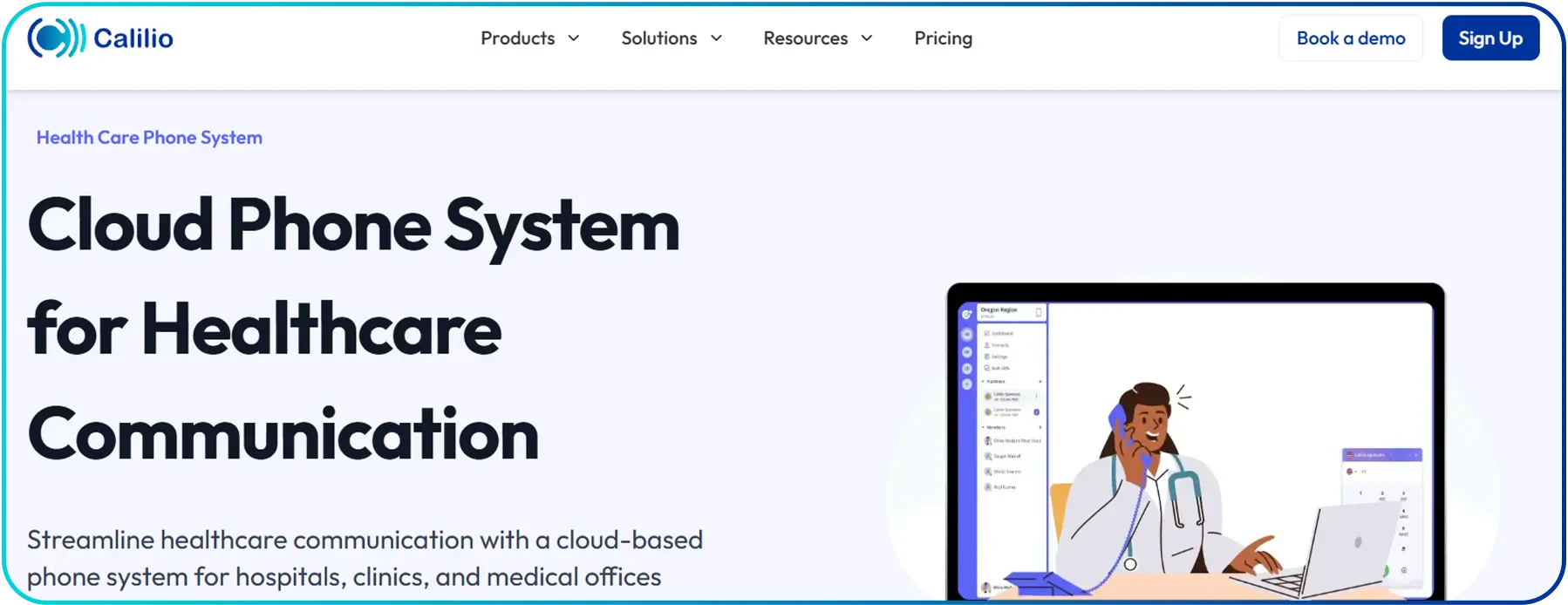
Moreover, it strictly follows all the security guidelines required for the health industry, ensuring the protection of sensitive patient information. It offers a healthcare business phone system with features like auto attendant and virtual call queues for managing incoming calls. And, power dialer, click-to-call, and call disposition tags to speed up outgoing calls.
2. Nextiva
Nextiva is a leading cloud phone system for healthcare. It is HIPAA-compliant and allows seamless interaction with patients via call, text, chatbot, email, and socials, too. It allows users to centralize all conversations to improve the experience for patients and staff.
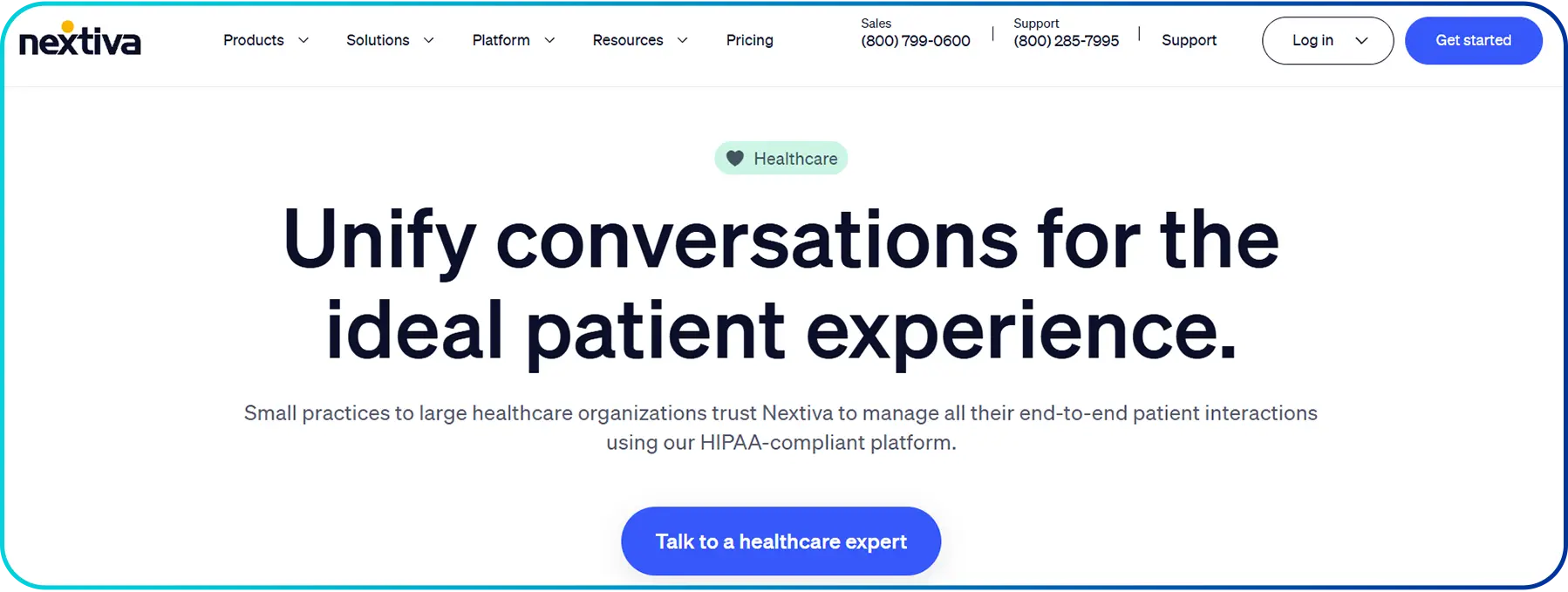
Nextiva is a leading cloud phone system for healthcare. It is HIPAA-compliant and allows seamless interaction with patients via call, text, chatbot, email, and socials, too. It allows users to centralize all conversations to improve the experience for patients and staff.
Users can schedule appointments and accept payments with AI. You can also set up virtual visits with Nextiva’s HD video conferencing. You can schedule appointments over text for personalized and efficient scheduling, as there is a high customer preference for secure texting in healthcare.
3. Five9
Five9 offers a trusted telecommunication platform designed especially for the healthcare industry. With Five9's intelligent virtual agent (IVA) in a healthcare center, it can handle appointment scheduling, route calls to the right department, and reduce the workload of the front-line staff. It also provides 24/7 self-service options and ensures that calls are routed correctly the first time, improving the resolution in the first call, i.e., first call resolution rate.
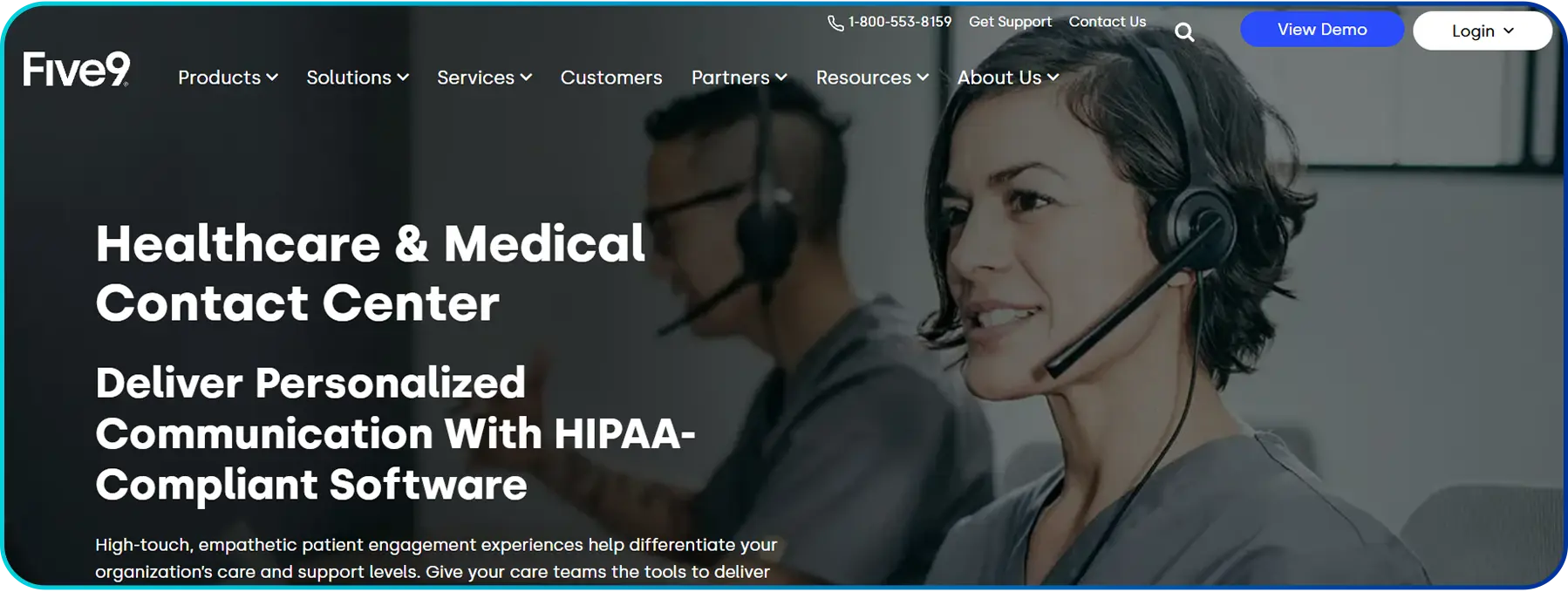
Moreover, Five9 offers pre-built integrations with leading CRMs like Salesforce, ServiceNow, Oracle, and Zendesk, providing agents with quick access to customer history and information, boosting efficiency.
4. Dialpad
Dialpad elevates the patient journey with its unified communications platform. It enables phone calls, video, and messaging through a single app for both internal and patient interactions. It also offers a digital self-service option to empower patients for appointment scheduling and other needs.
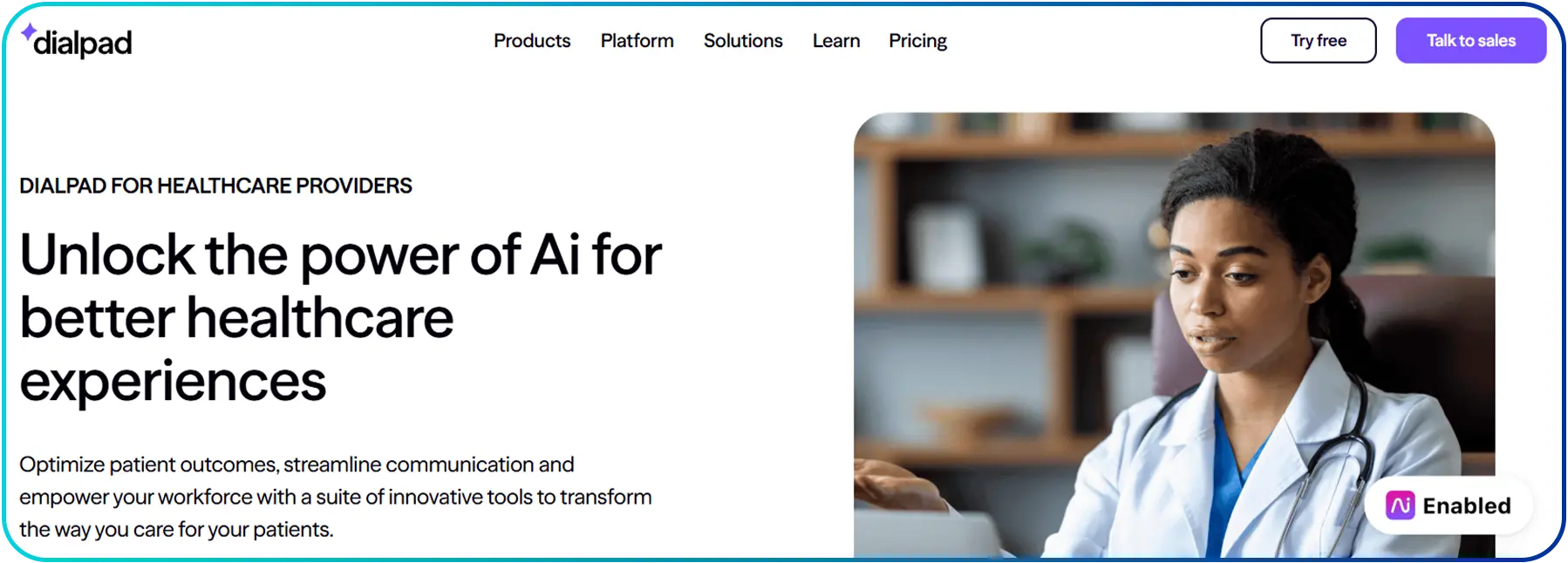
With Dialpad’s HD video conferencing, patients can receive smooth and uninterrupted virtual consultations, providing easy access to healthcare from the comfort of their own home. Its AI recaps features provide an accurate AI-curated synopsis and next steps after every call or meeting, essential for quick decision-making.
5. RingCentral
RingCentral provides a cloud-based business phone system and contact center solution to seamlessly connect patients and medical staff. RingCentral combines voice, video, SMS, and social to connect with patients and can automate patient access workflows and offer 24/7 support using AI virtual agents.
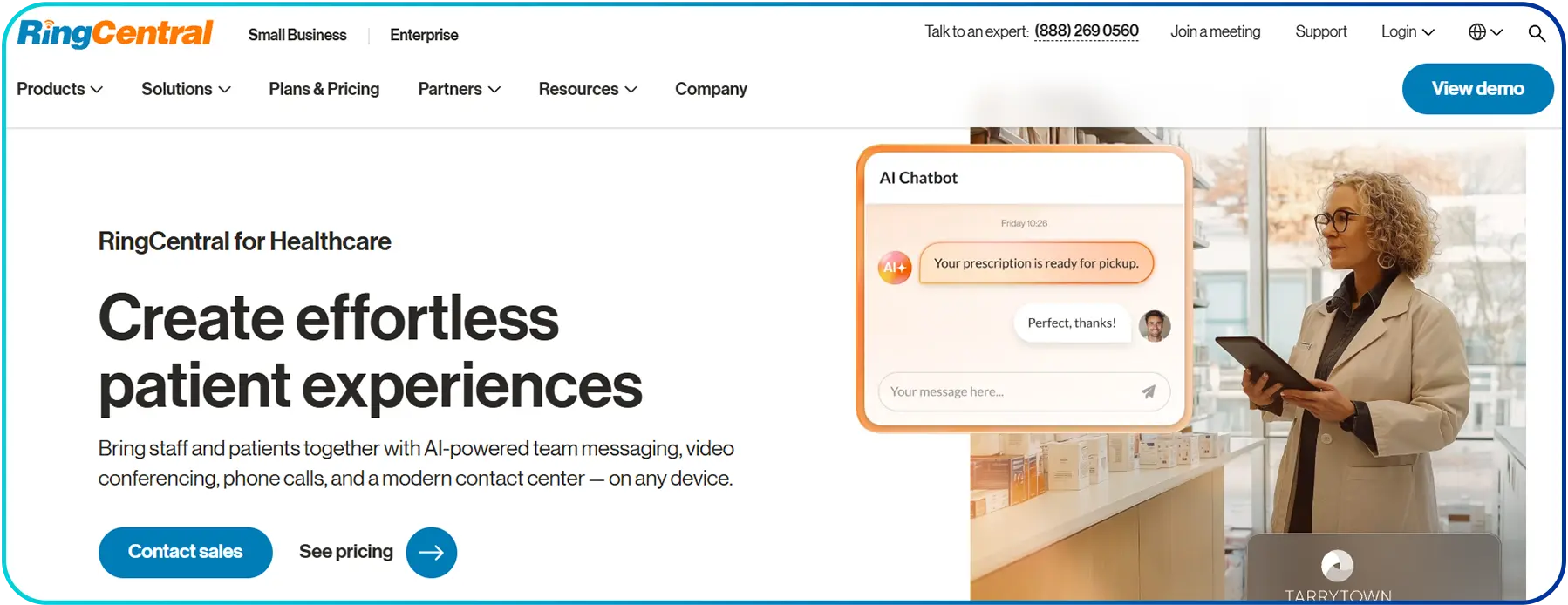
Staff can collaborate instantly using push-to-talk and share secure files and ePHI during consultations. Plus, built-in analytics show how your team is performing and how patients are responding.
With real-time Electronic Health Records (EHR) integration through tools like RingEX and RingCX, your staff gets instant access to patient data, appointment details, and medical histories. It allows you to provide a personalized experience and quicker service to patients while staying HIPAA compliant.
The Future of Cloud Telephony in Healthcare
The future of cloud phone systems for healthcare is promising, as there is a clear need for cloud telephony in the medical sector. A VoIP phone system in healthcare has immense potential to automate more time-consuming tasks and enhance the patient-doctor interaction.
With the rise of telemedicine and telehealth, integrating cloud telephony into healthcare has become essential. For example, features such as voice-to-text medical documentation and secure EHR integration are increasingly becoming the norm.
Additionally, EHR systems allow patients to access their medical records during calls, which significantly improves the speed and accuracy of healthcare delivery. As a result, this integration not only enhances efficiency but also ensures that both healthcare providers and patients have timely, accurate information readily available.
Moreover, AI-powered ambient listening, also known as AI scribes, is rapidly evolving in healthcare. These systems can listen to doctor–patient conversations in real time, transcribe notes, and even suggest next steps to patients. As this technology integrates with cloud telephony, expect smarter systems that personalize responses through interactive voice response (IVR) systems, guide patients based on urgency or medical history, and improve communication without human intervention.
Hence, looking ahead, cloud telephony will do much more than just manage the calls. As healthcare continues to evolve, cloud telephony will play an even bigger role in supporting remote care, reducing admin work, and enabling smarter, AI-driven interaction.
Conclusion
Cloud telephony is transforming healthcare by ensuring smooth, efficient interactions between providers and patients. With features like automated scheduling, secure virtual consultations, AI integration, cost-effective VoIP, and real-time analytics, it significantly boosts productivity and enhances patient satisfaction.
Cloud telephony helps you manage high volumes of calls while remaining HIPAA-compliant. It makes a cloud-based phone system an indispensable tool for modern healthcare that ensures seamless, reliable communication anytime, anywhere. Hence, the role of cloud telephony in healthcare is not just beneficial, it’s essential for the future of patient care.
Summarize this blog with:
Frequently Asked Questions
How is cloud telephony used in healthcare?
Cloud telephony in healthcare is used to manage patient communication efficiently through internet-based calling. It enables appointment reminders, virtual receptionists, smart call routing, secure voicemail, and integration with EHR systems.
What is the best VoIP for healthcare?
Is VoIP HIPAA compliant?

Still have questions?
Can’t find the answer you’re looking for? Please chat with our friendly team.
Stay in the loop
Get the latest call insights, trends, and updates delivered straight to your inbox.
By subscribing, you agree to receive updates from Calilio.
You can unsubscribe anytime.
